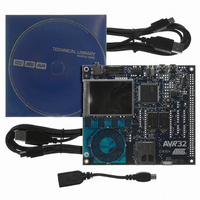ATEVK1104 Atmel, ATEVK1104 Datasheet - Page 309

ATEVK1104
Manufacturer Part Number
ATEVK1104
Description
KIT DEV/EVAL FOR AVR32 AT32UC3A
Manufacturer
Atmel
Series
AVR®32r
Type
MCUr
Datasheets
1.ATAVRONE-PROBECBL.pdf
(16 pages)
2.ATEVK1104.pdf
(826 pages)
3.ATEVK1104.pdf
(90 pages)
4.ATEVK1104.pdf
(6 pages)
5.ATEVK1104.pdf
(12 pages)
Specifications of ATEVK1104
Contents
Evaluation Board, Software and Documentation
Processor To Be Evaluated
AT32UC3A3
Data Bus Width
32 bit
Interface Type
USB, SPI, USART
Silicon Manufacturer
Atmel
Core Architecture
AVR
Core Sub-architecture
AVR UC3
Silicon Core Number
AT32UC3A3256
Silicon Family Name
AVR
Kit Contents
Board CD Docs
Rohs Compliant
Yes
For Use With/related Products
AT32UC3A3
Lead Free Status / RoHS Status
Lead free / RoHS Compliant
Available stocks
Company
Part Number
Manufacturer
Quantity
Price
Company:
Part Number:
ATEVK1104
Manufacturer:
Atmel
Quantity:
135
- ATAVRONE-PROBECBL PDF datasheet
- ATEVK1104 PDF datasheet #2
- ATEVK1104 PDF datasheet #3
- ATEVK1104 PDF datasheet #4
- ATEVK1104 PDF datasheet #5
- Current page: 309 of 826
- Download datasheet (20Mb)
Figure 26-5. Elementary Time Unit (ETU)
26.7.2
32058J–AVR32–04/11
Receiver and Transmitter Control
ISO7816 I/O Line
ISO7816 Clock
Generator Register (BRGR). The resulting clock can be provided to the CLK pin to feed the
smart card clock inputs. This means that the CLKO bit can be set in MR.
This clock is then divided by the value programmed in the FI_DI_RATIO field in the FI_DI_Ratio
register (FIDI). This is performed by the Sampling Divider, which performs a division by up to
2047 in ISO7816 Mode. The non-integer values of the Fi/Di Ratio are not supported and the user
must program the FI_DI_RATIO field to a value as close as possible to the expected value.
The FI_DI_RATIO field resets to the value 0x174 (372 in decimal) and is the most common
divider between the ISO7816 clock and the bit rate (Fi = 372, Di = 1).
Figure 26-5 on page 309
to a bit time, and the ISO 7816 clock.
After reset, the receiver is disabled. The user must enable the receiver by setting the RXEN bit
in the Control Register (CR). However, the receiver registers can be programmed before the
receiver clock is enabled.
After reset, the transmitter is disabled. The user must enable it by setting the TXEN bit in the
Control Register (CR). However, the transmitter registers can be programmed before being
enabled.
The Receiver and the Transmitter can be enabled together or independently.
At any time, the software can perform a reset on the receiver or the transmitter of the USART by
setting the corresponding bit, RSTRX and RSTTX respectively, in the Control Register (CR).
The software resets clear the status flag and reset internal state machines but the user interface
configuration registers hold the value configured prior to software reset. Regardless of what the
receiver or the transmitter is performing, the communication is immediately stopped.
The user can also independently disable the receiver or the transmitter by setting RXDIS and
TXDIS respectively in CR. If the receiver is disabled during a character reception, the USART
waits until the end of reception of the current character, then the reception is stopped. If the
transmitter is disabled while it is operating, the USART waits the end of transmission of both the
current character and character being stored in the Transmit Holding Register (THR). If a time-
guard is programmed, it is handled normally.
on TXD
on CLK
shows the relation between the Elementary Time Unit, corresponding
ISO7816 Clock Cycles
FI_DI_RATIO
1 ETU
AT32UC3A
309
Related parts for ATEVK1104
Image
Part Number
Description
Manufacturer
Datasheet
Request
R

Part Number:
Description:
DEV KIT FOR AVR/AVR32
Manufacturer:
Atmel
Datasheet:

Part Number:
Description:
INTERVAL AND WIPE/WASH WIPER CONTROL IC WITH DELAY
Manufacturer:
ATMEL Corporation
Datasheet:

Part Number:
Description:
Low-Voltage Voice-Switched IC for Hands-Free Operation
Manufacturer:
ATMEL Corporation
Datasheet:

Part Number:
Description:
MONOLITHIC INTEGRATED FEATUREPHONE CIRCUIT
Manufacturer:
ATMEL Corporation
Datasheet:

Part Number:
Description:
AM-FM Receiver IC U4255BM-M
Manufacturer:
ATMEL Corporation
Datasheet:

Part Number:
Description:
Monolithic Integrated Feature Phone Circuit
Manufacturer:
ATMEL Corporation
Datasheet:

Part Number:
Description:
Multistandard Video-IF and Quasi Parallel Sound Processing
Manufacturer:
ATMEL Corporation
Datasheet:

Part Number:
Description:
High-performance EE PLD
Manufacturer:
ATMEL Corporation
Datasheet:

Part Number:
Description:
8-bit Flash Microcontroller
Manufacturer:
ATMEL Corporation
Datasheet:

Part Number:
Description:
2-Wire Serial EEPROM
Manufacturer:
ATMEL Corporation
Datasheet:











